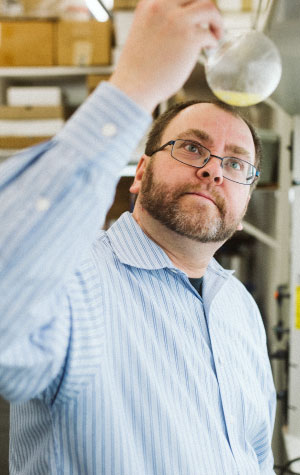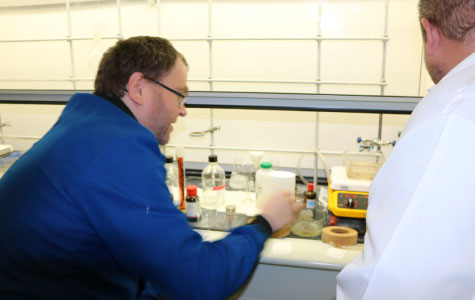Pharmacy Researcher Awarded NIH Grant
Trippier’s Lab Works to Help Pediatric Cancer Patients
 Paul Trippier, Ph.D., was interested in pediatric cancer treatment years before he
became an assistant professor for the Department of Pharmaceutical Sciences at the
TTUHSC School of Pharmacy in Amarillo.
Paul Trippier, Ph.D., was interested in pediatric cancer treatment years before he
became an assistant professor for the Department of Pharmaceutical Sciences at the
TTUHSC School of Pharmacy in Amarillo.
“These young patients have the most to lose with this disease, yet there is little research being performed specifically to develop drugs for childhood cancers,” Trippier says.
And that is where the five-year, $1.88 million research grant Trippier received in December from the National Cancer Institute at the National Institutes of Health (NIH) comes into play. He says the R01 grant, titled, “AKR1C3 Inhibitors as Chemotherapeutic Potentiators,” will help his team advance their research to the next level.
“The chemistry of the compounds used to develop highly selective inhibitors is fascinating, and the effects we are seeing in cells harvested from cancer patients are pretty spectacular,” Trippier says. “With the funding from the NIH, we can continue preclinical development of these compounds.”
Trippier, who came to the School of Pharmacy in 2012 after several years at Northwestern University in Illinois, says the AKR1C3 enzyme is over-expressed in several types of cancers where it functions to increase tumor aggressiveness and boosts resistance to a number of clinically approved chemotherapeutics. To neutralize these conditions, Trippier’s laboratory has developed small molecules that are the most selective inhibitors of the AKR1C3 enzyme ever created. In preliminary research, his laboratory has already shown it can completely counter drug resistance to a prostate cancer therapeutic in resistant cell lines.
“We also show that we can counter drug resistance to several clinical drugs in childhood leukemias, and we will continue development of these compounds in the hope of developing possible drug candidates,” Trippier says. “If we’re successful, these compounds can be combined with existing chemotherapeutics to counter drug resistance and to potentiate the anticancer effects, allowing lower chemotherapeutic dosing and fewer adverse side effects.”
In addition to side effects, Trippier says the possibility of patients developing resistance to their drug treatment regimen is another major obstacle in the fight against pediatric leukemias. The goal of his newly funded research project is to develop novel drug compounds that can counter the side effects and drug resistance issues and provide a better quality of life for pediatric leukemia patients taking chemotherapeutics.
 “Our compounds also have shown benefits in treating castration-resistant prostate
cancer, a highly aggressive advanced cancer that is very difficult to treat due to
rapid development of drug resistance,” Trippier says. “Again our compounds show promise
to overcome this resistance, which in the future may open up additional treatments
options for patients with this high mortality cancer.”
“Our compounds also have shown benefits in treating castration-resistant prostate
cancer, a highly aggressive advanced cancer that is very difficult to treat due to
rapid development of drug resistance,” Trippier says. “Again our compounds show promise
to overcome this resistance, which in the future may open up additional treatments
options for patients with this high mortality cancer.”
Trippier’s research team includes Trevor Penning, Ph.D., a long-time enzymology researcher at the University of Pennsylvania Perelman School of Medicine. Penning evaluates the potency of the Trippier lab’s compounds on AKR1C3. Trippier also collaborates with C. Patrick Reynolds, M.D., Ph.D., director of the TTUHSC School of Medicine Cancer Center in Lubbock for preclinical studies.
“Kshitij Verma, my very first graduate student who has now graduated and is working in the pharmaceutical industry, provided much of the preliminary data this new NIH grant was based on,” Tripper says. “The work is continuing with Ahmed Morsy, one of my current graduate students.”
Trippier also is quick to acknowledge previous support he received from a grant funded by Leukemia Texas, a local foundation and patient advocacy group based in Dallas.
“This NIH grant is an example of how local foundations can help advance research and
catalyze larger federal research support, all focusing on improving treatment for
patients” he says. ![]()
Related Stories
Celebrating Veterans: TTUHSC’s General Martin Clay’s Legacy of Service and Leadership
From his initial enlistment in the Army National Guard 36 years ago to his leadership in military and civilian health care management roles, Major General Martin Clay’s career has been shaped by adaptability, mission focus and service to others.
Texas Tech University Health Sciences Center School of Nursing Named Best Accelerated Bachelor of Science in Nursing Program in Texas
The TTUHSC School of Nursing Accelerated Bachelor of Science in Nursing (BSN) program has been ranked the No. 1 accelerated nursing program in Texas by RegisteredNursing.org.
TTUHSC Names New Regional Dean for the School of Nursing
Louise Rice, DNP, RN, has been named regional dean of the TTUHSC School of Nursing on the Amarillo campus.
Recent Stories
The John Wayne Cancer Foundation Surgical Oncology Fellowship Program at Texas Tech University Health Sciences Center Announced
TTUHSC is collaborating with the John Wayne Cancer Foundation and has established the Big Cure Endowment, which supports the university’s efforts to reduce cancer incidence and increase survivability of people in rural and underserved areas.
TTUHSC Receives $1 Million Gift from Amarillo National Bank to Expand and Enhance Pediatric Care in the Panhandle
TTUHSC School of Medicine leaders accepted a $1 million philanthropic gift from Amarillo National Bank on Tuesday (Feb. 10), marking a transformational investment in pediatric care for the Texas Panhandle.
Texas Tech University Health Sciences Center Permian Basin Announces Pediatric Residency Program Gift
TTUHSC Permian Basin, along with the Permian Strategic Partnership and the Scharbauer Foundation, Feb. 5 announced a gift that will fund a new pediatric residency.
